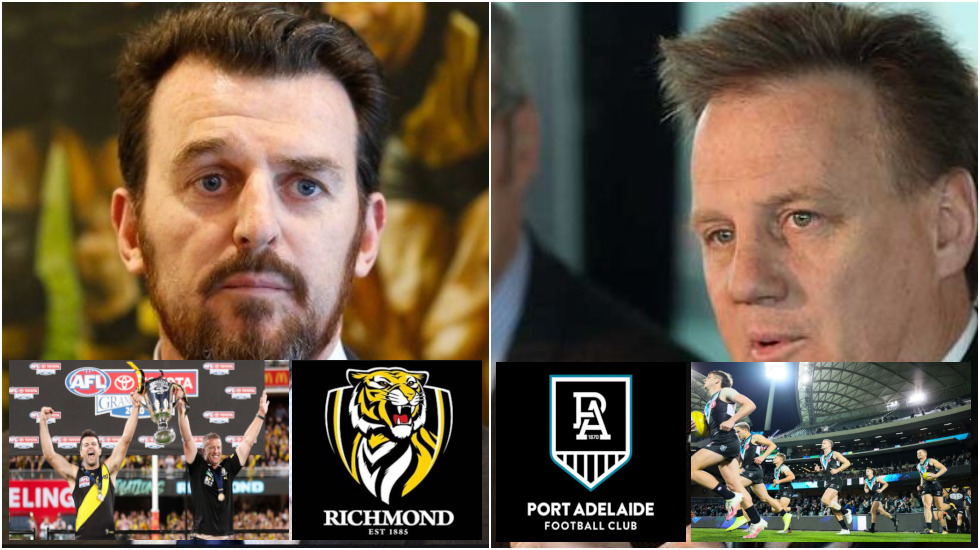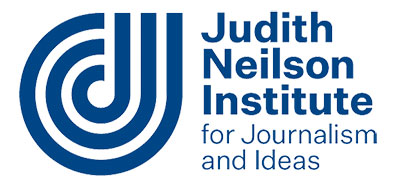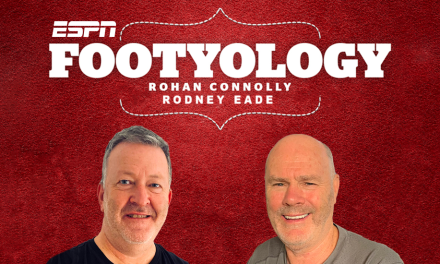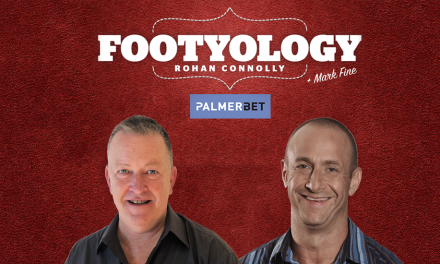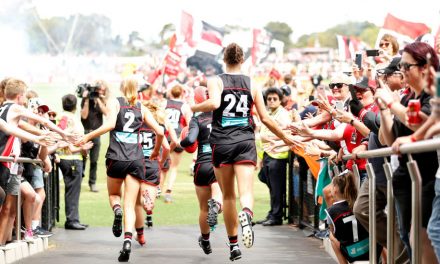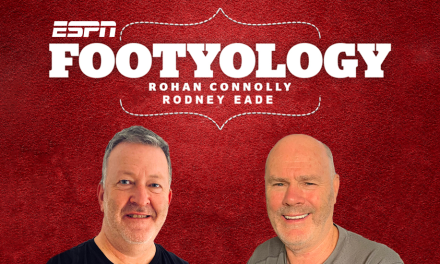Richmond chief executive Brendon Gale (left) and his soon-to-depart Port Adelaide counterpart Keith Thomas (right).
Some sharp wits live in the Twittersphere. Before the echo of the Adelaide Oval siren had finished bouncing off the bells of the nearby cathedral to announce Richmond was in its third AFL grand final in four years, the backhander on Twitter was as sharp as Dustin Martin’s fend-off.
That infamous picture of the rebellious seven-person “Focus on Football” group – led by Dr Martin Hiscock and featuring 1980 premiership players Bruce Monteath and Bryan Wood – was posted on Twitter. The message attached has slipped the memory but the point was not lost.
Who knows where Richmond would be had besieged club president Peggy O’Neal and chief executive Brendon Gale collapsed during those 17 days of torment at Punt Road in September 2016.
There is no doubt Gale would have found a bigger role in football (and life). But Richmond?
Gale, a 244-game Tiger of old, took charge of Richmond’s day-to-day operations as chief executive in mid-August 2009, when the AFL was still a 16-team competition (and Richmond was 29 years without a premiership).
From Gale’s first meeting at AFL House with his fellow club chief executives, only Brian Cook at Geelong and Greg Swann, then of Carlton and now at Brisbane, remain. The turnover of chief executives in “club land” was quite concerning – but also highlighting the risk of hiring “corporate” men rather than old football heads while the AFL was becoming a commercial beast with an addiction to big money.
A year after his introduction to club administration (after leading the players’ union), Gale was standing tall amid all the mocking of his grand plan to have Richmond debt-free, supported by 75,000 members (a target blown away by the Tigers being the first AFL club to crack the 100,000 mark) and with three premierships by 2020.
Mission accomplished.
At the same time as Gale was starting on a path many see leading to the AFL chief executive office, there was a return to a football head in the chief executive office at troubled South Australian club, Port Adelaide.
After trying a financier and then a brewery boss, Port Adelaide turned to a former Fitzroy player recruited from SANFL club Norwood, who was called from the cut-throat world of commercial radio to the less-forgiving stage of football administration.
Keith Thomas – 28 games with Fitzroy, 1987-1988, and 304 with Norwood, 1979-1986 and 1989-1993 – was first touted as the man to succeed long-serving SANFL chief executive Leigh Whicker.
Then he became tagged as Whicker’s “plant” at Port Adelaide to protect the SANFL’s interests while the South Australian club was a political pawn between AFL boss Andrew Demetriou and the SA Football Commission underwriting significant debt on the so-called basket case.
Thomas leaves the Port Adelaide chief executive’s office on Saturday having – like Gale – restored a traditional football club to its core values. The exit is not crowned with a premiership, but with Port Adelaide out of its darkest tunnel … and, to borrow the Richmond theme, strongly focused on football.
Thomas this week – at the Port Adelaide club champion count on Thursday – will merit a standing ovation as he takes his final bow at Alberton. Not bad for the man who arrived at the club in September 2011 needing to dispel all the suspicion on his agenda and who last year – in a troubled email to the agitated Port Adelaide membership – described himself as “the Norwood flog”.
Many will study Gale on the back of Richmond’s extraordinary success.
There should be just as much focus on Thomas’s decade at Port Adelaide, particularly his capacity to refloat a troubled football club while taking Port Adelaide from Football Park to Adelaide Oval and from Alberton to Shanghai, China.
This is a football club that – while being carved up on the field by Collingwood in round 20, 2011, in premiership hero Chad Cornes’ final game for Port Adelaide – was so close to the edge that 2004 premiership captain Warren Tredrea stormed out of a radio commentary box at Football Park at three quarter-time to seek out AFL boss Andrew Demetriou in a mercy telephone call.
Thomas was just weeks away from stepping into the club that was playing with tarps to cover empty seats at Football Park, was debt-ridden and working to a failed business model, and had its licence subject to speculation of being transferred to Tasmania and planning at AFL for rebadging as “Central Australia Power” with home games in Adelaide, Alice Springs and Darwin.
PLEASE HELP US CONTINUE TO THRIVE BY BECOMING AN OFFICIAL FOOTYOLOGY PATRON. JUST CLICK THIS LINK.
Thomas’ achievements at Port Adelaide – that is still Port Adelaide, as it has been since 1870, rather than a rebranded club – merit a premiership medal in football administration.
In his decade of leadership, Thomas has:
BROUGHT together a club that was once divided along AFL and SANFL lines. (When the Port Adelaide Football Club was handed its AFL licence in December 1994, the SA Football Commission demanded there be no link between the Port Adelaide AFL and SANFL operations – to the point memorabilia and fan gear for the AFL Power and SANFL Magpies could not be sold at the same souvenir booth at Alberton). While the battle to reunite Port Adelaide began in 2010, Thomas has fulfilled the strategy that is heralded at the start of every Port Adelaide home game with the “Never Tear Us Apart” anthem.
TAKEN Australian football – the game described as the “best in the world” but landlocked within Australia – to China, where Port Adelaide proved its expertise in completing a risky mission with AFL premiership matches in Shanghai. More importantly, Thomas secured significant corporate backing in China for a club caught way back in the queue for sponsorship dollars in the limited Australian market.
ENSURED Port Adelaide in 2014 entered Adelaide Oval in peak condition, on and off the field – indeed in better condition than the Crows at the time.
VIGOROUSLY fought to keep Port Adelaide in the SANFL – quite a commitment for a guy who was a hero at the traditional rival, Norwood (after growing up as a Port Adelaide supporter).
PUT the focus on football – and found the resources to ensure Port Adelaide is no longer a “have not” club with its football program.
REAFFIRMED to internal and external forces – “to all and sundry” as Thomas puts it – “what we value and what we stand for”.
Thomas made Port Adelaide “the Port Adelaide FOOTBALL Club” again.
Gale’s work at Richmond has been described by club president Peggy O’Neal as “almost personal … he wanted to make the place better because he’d had no success during his playing career.”
“That mission energised him,” says O’Neal, “and energised the fans who wanted to support Brendon (as a much-loved Richmond player).”
Thomas did not have a playing history with Port Adelaide, but his ethos of “give before you take; and do good things so good things happen to you” has served him well in winning the backing of the tough crowd at Alberton.
The disappointing note of the first AFL grand final being played out of Melbourne was that it denied a rematch of the 2004 play-off between Port Adelaide and Brisbane.
This would have drawn great reflection on how both clubs collapsed, burned two captains as novice coaches (Michael Voss at Brisbane and Matthew Primus at Port Adelaide) and had their relevance tested by poor on-field results and heavy debt.
As different as Port Adelaide and Brisbane have been in their revivals, there is one common link – a strong focus on football. Messrs Hiscock, Monteath, Wood et al did get that right.
David Noble, a club chief executive in the waiting, has given Brisbane its sharp focus on football. Thomas made sure his so-called hand-picked coach Ken Hinkley has worked with a strongly-supported football program.
Voss, who has spent the past six years at Port Adelaide, and Primus could have wished they were so lucky a decade ago.
Gale is so admirable for being true to Richmond at a time when AFL clubs are repeatedly told to stop “living in the past”.
Thomas reinforced Port Adelaide as Port Adelaide after many external forces demanded the club shed its past – and be more like the less-historic Crows – to grow the supporter base. The result was to drive away the traditional Port Adelaide fans, putting the club in a bigger hole, as noted by those tarps between crowds of 13,683 against West Coast and 13,953 against Brisbane in the darkest hours of 2012.
“They were voting with their feet,” recalls Thomas of the Port Adelaide fans in 2011-12. “They were agitated with the whole club. They were not happy with where we were at. I started in that environment – and with everyone understanding the club was at risk.
“It took a long time to convince the membership that change was afoot and that we were listening to them. We returned the club to its roots and core values – and immediately the members responded. Enormously.”
Both Thomas and Gale stood by their coaches – Ken Hinkley and Damien Hardwick – when the masses were seeking public executions. Hardwick now has three AFL premierships from three grand finals and is the longest-serving Richmond coach. Hinkley is on the brink of a long-term contract extension at Port Adelaide amid great optimism of repeating the Hardwick theme.
Thomas’ unwavering support of Hinkley did produce an extraordinary open letter to the Port Adelaide supporter base in late July last season, when Hinkley’s team had a 8-10 win-loss record that ultimately became 11-11 and a 10th ranking for the second consecutive season.
“The anger and frustration,” wrote Thomas, seeking to protect Hinkley, “has been broadly and colourfully distributed. It appears now squarely focused on the senior coach and the Norwood flog who employed him.
“We have a bigger problem – and I am to blame, not the footy department,” added Thomas, to declare a shift back to football-first themes at Alberton. “Somewhere along the road to greater growth and prosperity I’ve allowed us to drop the ball. We’ve got to fix it.”
The AFL minor premiership and a renewed hope of contending for the more meaningful premiership is the result of the auto-correct at Port Adelaide.
Thomas and Gale would make for a dream pairing at any seminar on refloating a business. The lesson from their decade in the chief executive’s chair is that they remembered Port Adelaide and Richmond were in the business of football.
Focus on football.
Wooden spooner Adelaide is about to try the same under the leadership of new chairman John Olsen after the Crows have strayed into empire building during the past five years. Essendon might take note.

